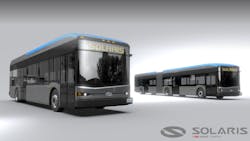King County Metro partners with Solaris to expand zero-emission bus fleet
King County Metro has entered into a contract with Solaris for two 40-foot and two 60-foot zero-emission buses with an option to procure 12 additional vehicles. The agency notes this partnership stands as Solaris’ first dealings with a U.S.-based transit agency as the company works to expand its presence in the North American market.
“At [King County] Metro, we are deeply committed to building a sustainable future through innovation and collaboration,” said King County Metro General Manager Michelle Allison. “Our goal is to create a zero-emission fleet that not only enhances our communities but also leads the way in environmental responsibility. Metro’s partnership with electric and hydrogen bus manufacturer Solaris will help overcome the bus manufacturing shortage and potentially provide more options for other transit agencies in North America, too.”
The partnership will help to diversify the number of transit suppliers in the U.S. where bus manufacturing shortages have created supply chain challenges for all transit agencies, notes King County Metro.
“In Europe, the Solaris brand is widely recognized for the quality and superior performance of its zero-emission vehicles. We aim to bring the same service and proven technology to the U.S. transit authorities,” said Solaris Bus & Coach CEO Javier Iriarte. “Our commitment is to support the transition to zero-emission transportation in cities across Europe and North America by developing and delivering the most reliable and innovative products. This contract marks significant progress for the bus industry in North America and has the potential to be a game-changer for the region over the coming decade.”
The first of the vehicles is scheduled to arrive in 2026. Solaris says the buses are designed specifically for the North American markets and feature progressive battery bus technology. King County Metro will put these vehicles through thorough testing and evaluations including shadow service to evaluate Solaris’ ability to meet the requirements of the North American market.
The agency’s current zero-emissions fleet includes battery-electric buses manufactured by New Flyer. The first of 89 new battery-electric buses purchased from GILLIG are scheduled to be delivered by the end of the year and are expected to go into service in 2026 when Metro’s Tukwila Base is scheduled to open.
